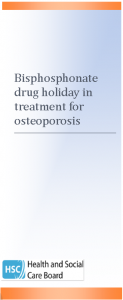Bisphosphonate Drug Holiday in Treatment for Osteoporosis
What is osteoporosis?
Osteoporosis is a condition that affects the bones, causing them to become weak and fragile and more likely to break (fracture).
What are bisphosphonates?
Bisphosphonates are medicines that are used to treat conditions that affect your bones, for example osteoporosis. Bisphosphonates include:
• Alendronate
• Etidronate
• Ibandronate
• Risedronate
Why should I take a drug holiday from my bisphosphonate treatment ?
Bisphosphonates are very helpful for preventing bone fractures in women and men with osteoporosis. Experts agree that they need to be taken for a number of years to see the benefits but some patients who have been taking these medicines for 5 years could benefit from a holiday from taking the tablets. For those at high risk of fracture, it may better to continue treatment for up to 10 years. After 10 years the benefits of taking bisphosphonates reduce, and the risk of some very rare side effects increases. These risks are rare, but include:
• Breaking a thigh bone,
• Problems with the health of your jaw
Your doctor can advise you and discuss the options with you. If you have been on a bisphosphonate for a long time, you may be nervous about stopping it. The decision to stop needs to be made by weighing up the risks and benefits for you. If you have been on a bisphosphonate for longer than five years and have not been reviewed, talk to your doctor about whether stopping is the right choice for you.
Do not stop this medicine without talking to your doctor.
Note: You must tell your dentist if you are taking a bisphosphonate. You will need to have regular dental check ups. This is because there is a very small chance that you may get a condition called ‘osteonecrosis of the jaw’.
What happens if I stop taking my bisphosphonate medication?
Your doctor will check your bone mineral density (BMD) every two to three years after stopping a bisphosphonate. If your tests show your bones are weakening faster than expected, you may be advised to restart treatment.
You can do a lot to help prevent bone breaks or fractures:
Complete weight-bearing exercises
Weight-bearing exercises are any exercise in which you are supporting your own body weight through your feet and legs (or hands and arms). Adults should be undertaking 30 minutes of moderate-intensity physical activity at least five days a week.
Examples include walking, climbing stairs, yoga, Tai-Chi, dancing and golf.
Lower your risk of falling
• Talk to your doctor or pharmacist if any of your medicines make you feel light-headed or dizzy.
• Have regular eye tests and wear glasses if you need them.
• Remove rugs and other trip hazards from your home.
• Be careful when going up and down stairs and always hold the bannister.
• Wear well-fitting footwear.
• Limit or avoid alcohol.
Stop smoking
Smoking has a detrimental effect on bone density, leading to a greater risk of all fractures including hip fractures and longer recovery times. Ask at your GP surgery or pharmacy about getting help to stop.
Calcium and vitamin D
Calcium and vitamin D may come from food, supplements, or a combination of
both. If you are told to use a calcium and vitamin D supplement or a vitamin D supplement it is important to take it as directed. Be careful not to take more calcium and vitamin D than is recommended as too much can be harmful.
How much calcium should I be getting?
3 to 4 portions of calcium rich foods per day, with portion sizes of 200 to 300mg.
How can I get that much calcium?
A daily intake of 1,000mg calcium can be obtained from eating all of these foods:
• 400ml milk (480mg)
• 125g plain yogurt (250mg)
• 30g hard cheese (225mg)
• Two slices of wholemeal bread
(60mg).
How do I get Vitamin D?
Our body creates most of our vitamin D from direct sunlight on our skin. The amount of time you need to spend in the sun for your skin to make enough vitamin D depends on a number of factors.
These include:
• Your skin type (how dark your skin is or how easily you get sunburnt).
• The time of year.
• What time of day it is.
Short daily periods (10-15 minutes) of sun exposure without sunscreen during the summer months (April to October) are usually enough for most people to make enough vitamin D.
The following groups of people may not get enough exposure to sunlight at any time of the year so they should consider taking a daily vitamin D supplement through out the year.
- Frail or housebound individuals
- Those in care or nursing homes
- Those who wear clothes that cover most of their skin while outdoors
Maintain a healthy weight
Maintaining a healthy weight will help prevent fractures if a fall does occur.
Alcohol
Drinking excessive amounts of alcohol appears to be a significant risk factor for osteoporosis and fractures. It is important to not exceed the government’s recommended limit of 14units per week for both men and women.
Further information
You can find further information about osteoporosis and bisphosphates at:
Patient.co.uk
patient.co.uk/health/bisphosphonates
Royal Osteoporosis Society
theros.org.uk/
NHS Choices
nhs.uk/Livewell/Summerhealth/Pages/vitamin-D-

